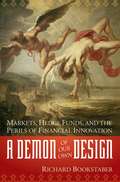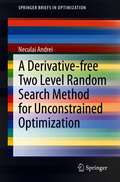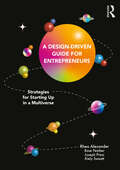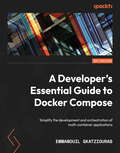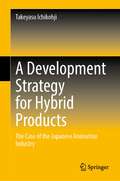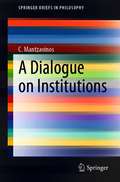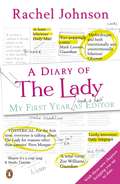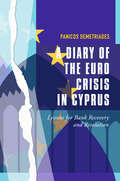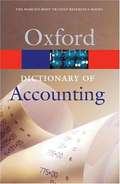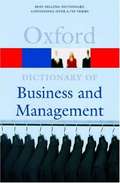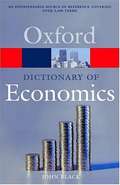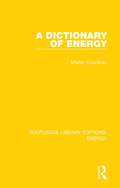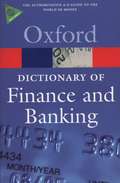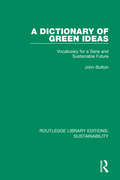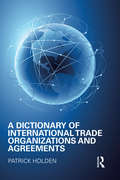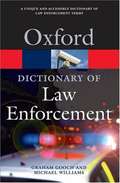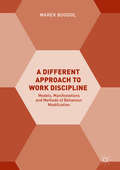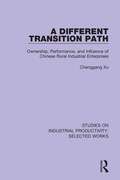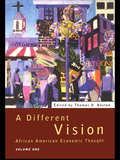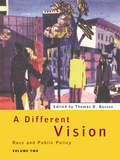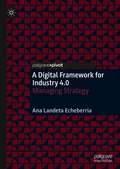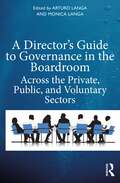- Table View
- List View
A Democratic Architecture for the Welfare State (Routledge Studies in the Management of Voluntary and Non-Profit Organizations)
by Victor A. PestoffThe welfare state faces various challenges in Scandinavia and many European countries today, including a poor work environment in the public sector, a growing democracy deficit, and demographic obstacles. In this new book, Victor A. Pestoff argues that the state cannot resolve these challenges alone or together with the market, rather it requires the active participation of citizens and the third sector in order to overcome them and become more sustainable and flexible in the future. This book addresses the need for a more democratic architecture for the European welfare state, opening new perspectives for developing alternative channels for direct citizen participation at the sub-municipal level of governance. Pestoff finds that neither democratic theory nor welfare state theory devotes adequate attention to the contemporary role of the third sector as a service provider or to greater direct citizen participation in the provision of welfare services. He shifts the focus of analysis from the input to the output side of the political system and explores new ways to promote a greater role for the third sector and more citizen participation in the provision of universal, tax financed welfare services. Part 1 discusses social economy actors in Sweden and Scandinavia, both from a historical and future perspective. Part 2 explores major issues for the third sector and welfare state, including the allocation of an organization’s surplus or profit, work environment and service quality in public services and the third sector, consumer perspectives on the social economy, democratizing medical and health care in Japan, and co-production of childcare services in eight European countries. Part 3 revisits the third sector and state in democratic theory and welfare theory, as well as recognizing major hurdles to the third sector and democratization of the welfare state. Part 4 concludes by summarizing the politics of participation in the welfare state.
A Demon of Our Own Design: Markets, Hedge Funds, and the Perils of Financial Innovation
by Richard BookstaberInside markets, innovation, and risk Why do markets keep crashing and why are financial crises greater than ever before? As the risk manager to some of the leading firms on Wall Street–from Morgan Stanley to Salomon and Citigroup–and a member of some of the world’s largest hedge funds, from Moore Capital to Ziff Brothers and FrontPoint Partners, Rick Bookstaber has seen the ghost inside the machine and vividly shows us a world that is even riskier than we think. The very things done to make markets safer, have, in fact, created a world that is far more dangerous. From the 1987 crash to Citigroup closing the Salomon Arb unit, from staggering losses at UBS to the demise of Long-Term Capital Management, Bookstaber gives readers a front row seat to the management decisions made by some of the most powerful financial figures in the world that led to catastrophe, and describes the impact of his own activities on markets and market crashes. Much of the innovation of the last 30 years has wreaked havoc on the markets and cost trillions of dollars. A Demon of Our Own Design tells the story of man’s attempt to manage market risk and what it has wrought. In the process of showing what we have done, Bookstaber shines a light on what the future holds for a world where capital and power have moved from Wall Street institutions to elite and highly leveraged hedge funds.
A Derivative-free Two Level Random Search Method for Unconstrained Optimization (SpringerBriefs in Optimization)
by Neculai AndreiThe book is intended for graduate students and researchers in mathematics, computer science, and operational research. The book presents a new derivative-free optimization method/algorithm based on randomly generated trial points in specified domains and where the best ones are selected at each iteration by using a number of rules. This method is different from many other well established methods presented in the literature and proves to be competitive for solving many unconstrained optimization problems with different structures and complexities, with a relative large number of variables. Intensive numerical experiments with 140 unconstrained optimization problems, with up to 500 variables, have shown that this approach is efficient and robust. Structured into 4 chapters, Chapter 1 is introductory. Chapter 2 is dedicated to presenting a two level derivative-free random search method for unconstrained optimization. It is assumed that the minimizing function is continuous, lower bounded and its minimum value is known. Chapter 3 proves the convergence of the algorithm. In Chapter 4, the numerical performances of the algorithm are shown for solving 140 unconstrained optimization problems, out of which 16 are real applications. This shows that the optimization process has two phases: the reduction phase and the stalling one. Finally, the performances of the algorithm for solving a number of 30 large-scale unconstrained optimization problems up to 500 variables are presented. These numerical results show that this approach based on the two level random search method for unconstrained optimization is able to solve a large diversity of problems with different structures and complexities. There are a number of open problems which refer to the following aspects: the selection of the number of trial or the number of the local trial points, the selection of the bounds of the domains where the trial points and the local trial points are randomly generated and a criterion for initiating the line search.
A Design Driven Guide for Entrepreneurs: Strategies for Starting up in a Multiverse
by Joseph Press Rhea Alexander Rose Pember Kiely SweattA new wave of entrepreneurs is leading a global paradigm shift towards values-driven business. This book empowers you to challenge the status quo and create value through its unique and adaptive approach to venture-building by design. Authored by a multidisciplinary team of practicing design strategists, business leaders, academics, and entrepreneurs, this hands-on guide models strategic design as a mindset for starting up: framing problems, applying methods, identifying opportunities, and creating pathways forward through futures and systems thinking. Carefully curated case studies of young impact-driven entrepreneurs along with resources, including action-based frameworks, diagrams, and templates for founders to replicate, and a reader’s checklist to enable the transformation of daily practice, will open new dimensions that amplify the global shift towards a more regenerative world and a multiverse of possibilities. Are you ready to journey to places where ideas for products, services, and experiences transform how we live and work? Then this guide is for you: the Design-Driven Entrepreneur.
A Developer's Essential Guide to Docker Compose: Simplify the development and orchestration of multi-container applications
by Emmanouil GkatziourasStart defining your infrastructure using Docker Compose and leverage it for everyday development or deploymentKey FeaturesDistribute your code in an easier way for developers to get startedSet up complex infrastructure for development and CI/CD purposesDeploy simple multi-container applications using Docker ComposeBook DescriptionSoftware development is becoming increasingly complex due to the various software components used. Applications need to be packaged with software components to facilitate their operations, making it complicated to run them. With Docker Compose, a single command can set up your application and the needed dependencies. This book starts with an overview of Docker Compose and its usage and then shows how to create an application. You will also get to grips with the fundamentals of Docker volumes and network, along with Compose commands, their purpose, and use cases. Next, you will set up databases for daily usage using Compose and, leveraging Docker networking, you will establish communication between microservices. You will also run entire stacks locally on Compose, simulate production environments, and enhance CI/CD jobs using Docker Compose. Later chapters will show you how to benefit from Docker Compose for production deployments, provision infrastructure on public clouds such as AWS and Azure, and wrap up with Compose deployments on said infrastructure. By the end of this book, you will have learned how to effectively utilize Docker Compose for day-to-day development.What you will learnCreate multi-container applications using Docker ComposeUse Docker Compose for daily developmentConnect microservices leveraging Docker network fundamentalsAdd monitoring to services leveraging PrometheusDeploy to production using Docker ComposeTranslate Compose files to Kubernetes deploymentsWho this book is forThis book is for software engineers, developer advocates, and DevOps engineers looking to set up multi-container Docker applications using Compose without the need to set up a Docker orchestration engine. It is also for team leads looking to increase the productivity of an organization's software teams by streamlining the provisioning of complex development environments locally using Docker Compose. Readers are expected to understand containerization and must possess fundamental Docker knowledge to get started with this book.
A Development Strategy for Hybrid Products: The Case of the Japanese Animation Industry
by Takeyasu IchikohjiThis is the first book that deals with technological innovation in Japanese animation industry from a management perspective. In reviewing prior research and explaining the history of the technology, the author raises the difficulty of dealing with new technologies. In particular, the focus is on systems that combine analog technology (drawing by hand) and digital technology (3D computer graphics or 3DCG) to create a product. This combined technology is referred to as "hybrid technology" in this book, and the development and management of "hybrid products" using this technology are studied. The study was conducted in two stages. The first stage was to determine the engineers’ (animators’) perception of hybrid technology. The results showed that in terms of potential, the hybrid technology of hand-drawn animation combined with 3DCG was rated more highly by engineers than hand-drawn alone. However, in terms of the assessment at that time, hybrid technology was rated higher than 3DCG alone but lower than hand-drawn. Therefore, it was assumed that hybrid technology, while useful, would pose challenges with respect to systematic implementation. The second stage was the development management of hybrid products. The results showed that the "adaptive engineer," who openly accepts other new technologies in the early stages of their emergence contributed to the integration of new and existing technologies.
A Dialogue on Institutions (SpringerBriefs in Philosophy)
by C. MantzavinosThis book consists of a dialogue between two interlocutors, Pablo and a student, who discuss a great range of issues in social philosophy and political theory, and in particular, the emergence, working properties and economic effects of institutions. It uses the dialogical form to make philosophy more accessible, but also to show how ideas develop through intellectual interaction. The fact that one of the interlocutors is the "student" in a place in the real world makes the dialogue quasi-fictive in character and enables the active engagement of the reader. After all, we are all philosophers and we develop our own philosophy by exchanging views and arguments. The dialogue form is and should remain the principal form of philosophizing, since ideas, like butterflies, do not merely exist – they develop. This is certainly the case in actual philosophical interaction, and it can be the case in written philosophical exposition. Although the dialogue does not presuppose prior acquaintance with the respective philosophical and social scientific literature under discussion in this book, it makes arguments more accessible, and conveys the feeling that there are no definite solutions to philosophical problems.
A Diary of The Lady: My First Year As Editor
by Rachel JohnsonRachel Johnson takes on the challenge of saving The Lady, Britain's oldest women's weekly, in her hilarious diary, A Diary of The Lady: My First Year and a Half as Editor.'The whole place seemed completely bonkers: dusty, tatty, disorganized and impossibly old-fashioned, set in an age of doilies and flag-waving patriotism and jam still for tea, some sunny day.'Appointed editor of The Lady - the oldest women's weekly in the world - Rachel Johnson faced the challenge of a lifetime. For a start, how do you become an editor when you've never, well, edited? How do you turn a venerable title, full of ads for walk-in baths, during the worst recession ever? And forget doubling the circulation in a year - what on earth do you wear to work when you've spent the last fifteen years at home in sweatpants?Will Rachel save The Lady - or sink it?'Action-packed, entertaining, marvellously indiscreet. Johnson is everything you want in a diarist and has a compulsive habit of saying the wrong thing' Sunday Times'She's a loose cannon. All she thinks of is sex. You can't get her away from a penis' Mrs Julia Budworth, co-owner, The Lady'A total romp, wonderfully readable, unflinchingly described' Guardian'HYSTERICAL. For the first time, everyone is talking about The Lady for reasons other than nannies' Piers MorganRachel Johnson is a journalist who has written two previous novels and two volumes of diaries. The Mummy Diaries, Notting Hell, Shire Hell and A Diary of The Lady are all available now from Penguin.
A Diary of the Euro Crisis in Cyprus: Lessons for Bank Recovery and Resolution
by Panicos DemetriadesThis book tells the story of the euro crisis in Cyprus from the inside. Written by the former Governor of the Central Bank of Cyprus, Panicos Demetriades, who was in office during this turbulent period, this book shows how the crisis unravelled through a series of key events that occurred during his tenure. Written in chronological order, and broadly based on the author's personal diary, starting from his first day in office, this volume brings together economics, banking, regulation, governance, history, politics and international relations. Presenting personal witness statements, including records of noteworthy telephone conversations, informal meetings and other milestones, it examines crucial questions like: How did Cyprus become so systemically important to the rest of the euro area? Why was Cyprus treated so differently in comparison to other peripheral countries in Europe? Why were bank depositors targeted? What role did Cyprus' links with Russia play in the design of the programme? What has been the toxic fallout from the bail-in? Are there any longer-term implications for the euro? What are the lessons for regulators around the world? The book will appeal to readers interested in financial crises, the euro's architecture, the evolution of the European Monetary Union, and those with an interest in how Europe and the IMF dealt with crises in peripheral European countries.
A Dictionary of Accounting (3rd edition)
by Jonathan Law Gary OwenThis dictionary offers comprehensive coverage of financial and management accounting. Nearly 4,000 clear and accessible entries give straightforward definitions of terms, concepts, and jargon. It is a resource for students and professionals in the fields of accounting and finance. Topics include financial reporting, direct and indirect taxation, auditing, corporate finance, and accounting bodies and institutions. It is fully updated to reflect the latest developments, particularly the growing importance of international accounting standards and the rise of activity-based costing systems. New features include worked examples, web links, and feature entries on key topics.
A Dictionary of Business and Management (4th edition)
by Jonathan LawThe Dictionary of Business and Management is a wide-ranging and informative guide to all areas of business. It features up-to-date coverage of over 6,700 terms from marketing to taxation and accounting, business strategy and international finance. In this new edition, Jonathan Law covers all aspects of marketing, taxation, accounting, investment, banking and internal finance. Including comprehensive coverage of management concepts, theories and jargon, and human resources, the book reflects the increased focus on these areas in modern business. It also covers e-commerce, including up-to-date vocabulary for buying and selling online. The Dictionary of Business and Management has been expanded to cover the expansion of the European Union, and contains a new appendix listing useful websites and addresses for further research.
A Dictionary of Economics (2nd edition)
by John BlackUp-to date, authoritative, and comprehensive coverage of 2,500 key economic terms explained in a jargon-free style. An indispensable reference work for all students of economics, professional economists, or those having to deal with economic data or writing.
A Dictionary of Energy (Routledge Library Editions: Energy)
by Martin CounihanOriginally published in 1981. Every aspect of Energy – production, conversion and use - is discussed and explained in this unique dictionary. Comprehensive and well-illustrated entries cover fossil and other types of chemical fuel; hydro-electric and nuclear power; energy conservation; solar energy of every kind; wind, wave and tidal power. Every type of nuclear reactor is described, with emphasis on the energy technologies that have the greatest relevance and future promise. The first section is devoted to a careful explanation of the units used, with conversion tables; key concepts are precisely defined. The closing sections comprise tables of international energy statistics and a short bibliography. This is an excellent introduction and invaluable reference work for general readers, students and all workers in energy and energy-related fields.
A Dictionary of Finance and Banking (4th edition)
by Jonathan LawWith over 5,100 entries on all aspects of finance and banking, this fully updated reference is definitely a worthwhile investment. Over 200 new entries have been added to this edition and it has been fully updated to reflect recent developments such as structured finance and the subprime lending crisis. The dictionary defines terms from personal and international finance--including money markets, private investments and borrowing, foreign exchanges, and public and government finance--and now offers expanded coverage of central banking, monetary policy, and financial institutions. Feature entries have been included in this edition for the fuller explanation of topical and complex areas, e.g. Financial Times Share Indexes, and bankruptcy law. Recommended up-to-date web links for many entries, accessed via the Dictionary of Finance and Banking companion website, provide valuable extra information that will be regularly updated. With clear and accessible definitions, this jargon-free dictionary is a perfect companion volume to the other financial titles in this best-selling series--A Dictionary of Business and Management, A Dictionary of Accounting, and A Dictionary of Economics--and provides accurate and valuable information for students, practitioners, private investors, and readers of the financial pages alike.
A Dictionary of Green Ideas: Vocabulary for a Sane and Sustainable Future (Routledge Library Editions: Sustainability #1)
by John ButtonFirst published in 1988. A Dictionary of Green Ideas collects together the concepts which go to make up a green view of the world. Ecology and the environment, conservation and appropriate technology, politics and philosophy, peace and health, spirituality and world development - all these areas and more are reflected in nearly 1500 entries. The entries range from the very short to full-length essays, reflecting the diversity of the subject matter. All give a clear definition of the meaning of the term and an indication of its etymology and earliest use. But the Dictionary of Green Ideas is much more than simply a list of definitions. The concepts discussed are elaborated upon, interpreted, set in context, exemplified by quotations from a wide range of sources, and related to other entries by means of an extensive network of cross-references. The result is a fascinating and immensely readable book which successfully fulfils a double role as an accessible introduction to green thought, and as a source of reference offering new insights to green thinkers of long standing.
A Dictionary of International Trade Organizations and Agreements
by Patrick HoldenContinuing globalization has meant the increased development and importance of regional and international trade organizations and trade agreements. This Dictionary provides a background to the historical development of such systems, as well as giving a global overview of the current situation. The introduction, as well as explaining the historical background, discusses the major political and economic ideas and controversies, and analyses the current dynamic between international and regional trade organizations. Impartial analysis and up-to-date information is given in a concise way, detailing: major international, regional and bilateral trade agreements and organizations other national and international organizations involved in trade core concepts/theories in relation to international economics/development and international co-operation major trade negotiations and disputes other topics of importance, such as globalization. Entries are listed alphabetically, and fully cross-referenced for ease of use. Entries include: Africa Trade Network, Bretton Woods, China-ASEAN Free Trade Area, Dumping, Globalization, Mercosur, Pan-Arab Free Trade Area, Treaty of Nice, World Bank, WTO Secretariat and WWF
A Dictionary of Law Enforcement
by Michael Williams Graham GoochA Dictionary of Law Enforcement is the only dictionary available with a primary focus on UK law enforcement terms. Succinct and practical in its approach, it contains over 3,400 entries covering ever aspect of this diverse field, including terms related to law, pathology, forensic medicine, accountancy, insurance, shipping, commerce and trade, criminology, and psychology. Entries are supported by a wealth of practical information, including (where appropriate), citations and references to statutes and legislation. In addition to the definitions, the dictionary also contains five useful appendices: Abbreviations and Acronyms, Recordable Offences, Disclosure Code, Disclosure Guidelines and Disclosure Protocol. Written by two former police officers, both now lecturers in law and criminal investigation, the dictionary fills a significant gap in the law market and will be invaluable to police officers and trainee officers, students and lecturers of criminology, criminal justice, and police studies, and other professionals needing clear definitions of law enforcement terms.
A Different Approach to Work Discipline: Models, Manifestations And Methods Of Behaviour Modification
by Marek BugdolProviding insight into the currently applied models, basic definitions and functions of work discipline systems within organisations, this book analyses the risks, limitations and the potential of developing organisational discipline structures. It examines various examples and manifestations of unethical and criminal behaviour in the workplace and places special emphasis on informal punishment structures and the conditions under which they occur. Difficult topics are tackled including sabotage, theft, bullying, financial fraud, sexual harrassment and blackmail. Assessing the effectiveness of work discipline systems upon organisational behaviour, this innovative book offers practical solutions for managers, as well as new approaches for those studying human resource management.
A Different Transition Path: Ownership, Performance, and Influence of Chinese Rural Industrial Enterprises (Studies on Industrial Productivity: Selected Works #8)
by Chenggang XuOriginally published in 1995 this volume examines and analyzes the factors that have made the township-village enterprise (TVE) such a driver of growth in the Chinese economy in recent years. The book analyzes the background of the TVE and discusses regional differences in TVE efficiency as well as examining the apparent contradiction of the success of the TVE despite the lack of well-defined property rights. Issues of rural-rural and rural-urban migration phenomena are discussed and the differences discussed between the Chinese economy and those of other developing nations.
A Different Vision: African American Economic Thought, Volume 1 (African American Economic Thought Ser. #Vol. 1)
by Thomas D. BostonFirst published in 1996. Routledge is an imprint of Taylor & Francis, an informa company.
A Different Vision: Race and Public Policy, Volume 2 (African American Economic Thought Ser. #Vol. 2)
by Thomas D. BostonFirst published in 1996. Routledge is an imprint of Taylor & Francis, an informa company.
A Different Way to Formulate Your Business Strategy: Seven Tenets of a Strategy for Sustainability
by Adam WerbachIf organizations hope to survive in a rapidly changing world faced with diminishing resources, growth of the human population, and other formidable challenges, they must increase internal and external transparency, engage their great repositories of knowledge and talent, and connect more purposefully to the social, economic, environmental, and cultural systems in which they do business. They must create strategies for sustainability. In this chapter, leading environmentalist and sustainability expert Adam Werbach looks at cautionary tales of several companies that were supposedly "built to last," but were really not that sustainable after all, and describes a different approach to formulating a strategy that places long-term thinking at the core of the endeavor. This chapter was originally published as chapter 1 of "Strategy for Sustainability: A Business Manifesto."
A Digest of WTO Jurisprudence on Public International Law Concepts and Principles
by Graham CookIn its first twenty years, the WTO dispute settlement system generated over 350 decisions totalling more than 60,000 pages. These decisions contain many statements by WTO adjudicators regarding the law of treaties, state responsibility, international dispute settlement, and other topics of general public international law. This book is a collection of nearly one thousand statements by WTO adjudicators relating to admissibility and jurisdiction; attribution of conduct to a State; breach of an obligation; conflicts between treaties; countermeasures; due process; evidence before international tribunals; good faith; judicial economy; municipal law; non-retroactivity; reasonableness; sources of international law; sovereignty; treaty interpretation; and words and phrases commonly used in treaties and other international legal instruments. This comprehensive digest presents summaries and extracts organized systematically under issue-specific sub-headings, making this jurisprudence easily accessible to students and practitioners working in any field of international law.
A Digital Framework for Industry 4.0: Managing Strategy
by Ana Landeta EcheberriaThis book examines the impact of industry 4.0, and constructs a strategic digital transformation operational framework to prepare for it. It begins by examining the background of industry 4.0, exploring the industrial internet, new business models and disruptive technologies, as well as the challenges that this revolution brings for industries and manager. The research enhances our understanding of strategic digital transformation framework within industry 4.0. It will be valuable reading for academics working in the field of industry 4.0 and strategy, as well as practitioners interested in enhancing their firms’ readiness for industry 4.0.
A Director's Guide to Governance in the Boardroom: Across the Private, Public, and Voluntary Sectors
by Arturo LangaThis book is a practical guide for executive and non-executive directors and aspiring directors to lead, govern, and steer UK-based organisations to long-term sustainable success. In today’s turbulent environment, corporate governance is increasingly scrutinised, and this book will consider how directors can ‘bring the future forward’ with respect to responsible and ethical governance and leadership against the challenging political, environmental, and economic backdrop. While other books discuss UK corporate governance, this one uniquely demonstrates how the work of directors can build an organisation’s antifragility, and offers a view of stewardship approaches to every sector and type of UK organisation, from large premium listed companies to start-ups, the public sector, not-for-profits, partnerships, and family-owned and private-equity-backed organisations. Aspiring and experienced directors will each benefit from this book as well as those who provide board evaluation services, professional advisers, auditors, and those who provide training and other support for board members.

